- Register
- Log in to Tune-In
- Wishlist (0)
-
Shopping cart
(0)
You have no items in your shopping cart.
Beatles News

Paul McCartney drew inspiration from many different sources as a songwriter. It is a technique he still employs over 60 years after starting his music career. However, the ideas for some of Paul’s songs came from unlikely origins, including a 1789 poem published by Elizabethan poet Thomas Dekker that he used to write a climactic Abbey Road song.
Of all The Beatles, Paul takes a very pragmatic approach to songwriting. He viewed it as a job, a means to an end to a new song. It was an approach he used when first writing songs with John Lennon.
“If I were to sit down and write a song, now, I’d use my usual method: I’d either sit down with a guitar or at the piano and just look for melodies, chord shapes, musical phrases, some words, a thought just to get started with,” he said in an interview with NPR.
“Then I sit with it to work it out, like writing an essay or doing a crossword puzzle. That’s the system I’ve always used that John [Lennon] and I started with,” he continued.
Source: Lucille Barilla/cheatsheet.com
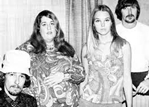
The Mamas & the Papas’ Michelle Phillips said The Beatles’ “Love Me Do” didn’t sound “proper.” She thought the song was awesome anyway. “Love Me Do” became a hit single three times in three decades in the United Kingdom.
The Mamas & the Papas’ Cass Elliot said she didn’t enjoy The Doors as much as The Beatles. Subsequently, The Mamas & the Papas’ Michelle Phillips discussed what she felt about The Beatles’ “Love Me Do.” Notably, the song reached No. 1 in the United States but not the United Kingdom.
During a 1968 interview with Rolling Stone, Elliot discussed her taste in music. “Like, today, I’d rather hear Jimi Hendrix,” she said. “Today.
“The Doors, for instance: I can’t really get into their music,” he added. “I find it very one-dimensional. True, it’s far out. But when you get there finally, it’s just in one. It doesn’t surround me or take me away, whereas The Beatles always have completely turned me on.”
Source: Matthew Trzcinski/cheatsheet.com

The Beatles often experimented with various instruments and recording techniques. Their songs often sound different, partly due to The Beatles’ innovative tendencies. For example, George Harrison often incorporated the sitar into several tracks to generate a surreal sound. One of The Beatles’ more underrated songs was created by Paul McCartney, who was experimenting with a tape recorder.
“Rain” was released in 1966 as the B-side to their “Paperback Writer” single. Both songs were recorded during their Revolver sessions, but neither made the album. The song was written by John Lennon and is often considered one of The Beatles’ more underappreciated tracks.
The track is notable for its unorthodox recording techniques and the rapid drumming by Ringo Starr, who said “Rain” is the best drum performance of his career. In an interview with Conan O’Brien, Starr said it was the first and last time he played “that busy.”
Source: Ross Tanenbaum/cheatsheet.com
details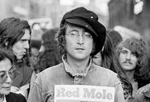
John Lennon dreamed of a better world with “Imagine” — and criticized Britain’s attitude toward immigrants in the Beatles’ “Get Back.” Still, this songwriter described himself as “slightly cynical,” even if he doesn’t want to be labeled as a cynic.
Lennon was a peace activist — even if he was “slightly cynical.” The Beatles became one of the world’s biggest bands comprised of “Fab Four” members Lennon, Paul McCartney, Ringo Starr, and George Harrison.
Lennon appeared as a Beatles songwriter, co-writing with McCartney and eventually branching out as a solo artist. In one interview, this songwriter described himself as “slightly cynical,” but he doesn’t want to be labeled exclusively as a cynic.
During a 1966 interview with Look Magazine, Lennon elaborated on the sacrifices the Beatles made — especially in the beginning. They had to wear suits and shorten their hair to get jobs in London. As of 1966, the songwriter said his life is about the “truth as he sees it.”
“I’m not a cynic,” Lennon said (via Beatles Interviews). “They’r details

Sir Paul took the images during "an intense three-month period of travel" in 1963 and 1964 but believed they had been lost.
He said unearthing them had "plunged" him "right back" into the experience.
The photos will be shown at the National Portrait Gallery as part of its relaunch and published in a book.
Paul McCartney Photographs 1963-64: Eyes of the Storm will run between 28 June and 1 October as one of two major exhibitions that will launch the London gallery's summer programme.
The images document December 1963 to February 1964, a period which was an important one for the Liverpool band, taking in their meteoric rise to global superstardom, their record-breaking appearance on The Ed Sullivan Show and the four-piece's youngest member George Harrison's 21st birthday.
Source: BBC News
details
The Beatles’ 1968 self-titled album had most of its songs written in the spring of that year when the band were at a Transcendental Meditation course in Rishikesh, India. From May to October, the Fab Four recorded the album at Abbey Road, where arguments broke out over creative differences. Tensions also weren’t helped by the continual presence of John Lennon’s new girlfriend Yoko Ono, who broke The Beatles’ rule of not having wives or partners in the studio. However, in a new interview, Sir Ringo Starr claimed that a song written for the record by Lennon reunited The Beatles, making them closer than ever before.
Source: George Simpson/express.co.uk
details
Paul McCartney was in the eye of the storm, Beatlemania, in 1964 when his group took over the world.
Now it seems he’s found a treasure trove of photos he took on a 35mm camera when it all happened. A book is coming called “Eyes of the Storm” on June 13th, five days before Sir Paul’s 81st birthday.
The photos were taken in six cities: New York, Washington, London, Liverpool, Miami, and Paris. There are 275 pictures. The book will have an introduction by Paul, plus essays by Jill Lepore and Nicholas Cullinan.
Source: Roger Friedman/showbiz411.com
details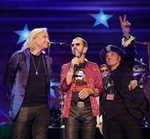
Ringo Starr’s first tour as a solo artist was a big deal. Aside from a few one-off performances, he hadn’t played live since his time in The Beatles. Meaning that when the All-Starr Band debuted in 1989, it had been more than 20 years since the drummer toured. Ringo faced his fears on that tour as it was the first test of his newfound sobriety, but he inspired a fellow Rock & Roll Hall of Famer to embrace sobriety, too.The Beatles’ breakup wasn’t easy for Ringo. He lost the three people he routinely called his brothers as the Fab Four fractured in a storm of ego clashes and in-fighting. The drummer reached unprecedented heights with the band, and it was all gone by 1970.
Source: Jason Rossi/cheatsheet.com
details
Previously unseen portraits taken by Paul McCartney at the outset of The Beatles’ fame will be displayed for the first time later this year.
The collection of 275 photographs will be shown to the public at the newly refurbished National Portrait Gallery (NPG) in London from June 28 to October 1. ‘Paul McCartney Photographs 1963-64: Eyes of the Storm’ comprises 35mm shots taken in London, Paris, Liverpool, Washington and New York between December 1963 and February 1964, as Beatlemania took hold worldwide.
McCartney previously thought he had lost the collection, but recently rediscovered it, leading him to approach the NPG in 2020. “He said he’d found these photographs that he remembers taking but thought had been lost,” said the gallery’s director, Nicholas Cullinan. “We sat down with him and began going through them. [It was] extraordinary to see these images – which are unseen – of such a well-documented, famous and important cultural moment.”
Source: Joe Goggins/uk.news.yahoo.com
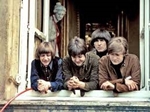
One of the most famous quotes attributed to John Lennon was never actually said by him.
At the height of their fame in the mid-1960s, the Beatles were the name on almost everyone's lips. The Fab Four member who caught more flack than the others, rather unfairly, was drummer Ringo Starr.
This is where one of the most famous misquotes of all time arises. John Lennon was known for his quick wit, and almost sarcastic responses to most questions from the media.
The story goes that when asked by a reporter whether Ringo was the best drummer in the world, Lennon reportedly responded: "he wasn’t even the best drummer in the Beatles."
Despite the high tensions at the time of the Fab Four's split, it seems unlikely John would disrespect his bandmate in this way, and that is because Lennon never actually said this.
The joke can be traced back to 1981, as pop culture journalist Tim Worthington discovered while listening to an old Radio 4 comedy series called Radio Active. He found the joke made by Philip Pope, who would later be known for his role in Spitting Image.
Source: Aaron Curran/liverpoolecho.co.uk

The Beatles were known for their “exuberant” fans — even sparking the term “Beatlemania.” (There was even a time when Ringo Starr’s then-girlfriend was scratched by a crazed fan.) Here’s what these artists said about their dangerous experiences with crowds, with Paul McCartney joking about police involvement.
The Beatles is the band behind “Strawberry Field Forever,” “In My Life,” “I Want to Hold Your Hand,” and other hits. Together, McCartney, John Lennon, George Harrison, and Ringo Starr made history with their impact on pop culture.
They were also one of the first rock groups from the UK to make it big in America — and across the globe. At the height of their popularity, the Beatles were the cause of mass hysteria among fans, with some screaming, vomiting, and even fainting at the sight of the Fab Four. The phenomenon was named “Beatlemania,” which was later discussed by band members.
Source: Julia Dzurillay/cheatsheet.com
detailsGeorge Harrison said he missed The Beatles‘ days in Hamburg, Germany. He enjoyed their camaraderie and carefree performances that went on late into the night. It was every band’s dream.
In 1960, The Beatles’ first manager, Allan Williams, organized their residency in Hamburg, Germany. They set out in August, and a couple of days later, they arrived in the Reeperbahn, Hamburg’s red-light district. The streets were crowded with gangsters, gunrunners, gaudy clubs, and seedy restaurants.
To George, it was the most exciting place.
“It was good fun, you know, but when we moved into the second club we were becoming so popular with the crowd of regulars, that we never got in any problems with all these gangster sort of people,” George told Crawdaddy in 1977 (per George Harrison on George Harrison: Interviews and Encounters).
Source: Hannah Wigandt/cheatsheet.com
details
George Harrison didn’t see much difference between The Beatles‘ Rubber Soul and Revolver. He thought the group could’ve released them as Vol. 1 and Vol. 2.
George enjoyed making Rubber Soul and Revolver. The Beatles were experimenting in the recording studio more than ever, which was exciting. Their lyrics and musical direction were becoming more complex by the day.
In 1977, George told Crawdaddy (per George Harrison on George Harrison: Interviews and Encounters), “I liked when we got into ‘Rubber Soul,’ ‘Revolver’—each album had something good about it and progressed.”
In 1992, George told Guitar World that working on Rubber Soul and Revolver was like being “lost in the middle of it-not knowing a thing-and at the same time somehow knowing everything.”
Source: Hannah Wigandt/cheatsheet.com
details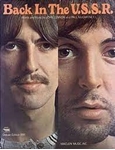
Paul McCartney wrote The Beatles’ “Back in the U.S.S.R.” but John Lennon played on the track. The tune was partly a parody of a Chuck Berry song. The song became a hit single six years after The Beatles’ breakup.
The Beatles‘ “Back in the U.S.S.R.” was mostly Paul McCartney’s song. He said the song was inspired by American attitudes. Despite this, the track was a single in the United Kingdom but not in the United States.The book All We Are Saying: The Last Major Interview with John Lennon and Yoko Ono features an interview from 1980. In it, John discussed his feelings about albums. “I’m not satisfied with any individual or Beatles album,” he said. “There’s too many fill-ins and padding. I like the inspired stuff, not the created, clever stuff.
“But I do like Pepper for what it is. I like The White Album for what that is, and I like Revolver and I like Rubber Soul,” he added. “So there aren’t many others, are there? I also like our first album because we made it in twelve hours.”
John discussed the first song from The White Album: “Back in the U.S.S.R.&rdquo details

The Beatles as we know them materialized when Ringo Starr replaced Pete Best on drums. John Lennon once said the band could have continued with just him and Paul McCartney, but it’s hard to imagine them having the same success without Ringo or George Harrison. Their first drummer continued making music after Ringo took his place, but Best called out The Beatles over Magical Mystery Tour, which made him lose interest in his former band.The Fab Four created one of the most enduring albums of the 20th century with 1967’s Sgt. Pepper’s Lonely Hearts Club Band. Later that year, they returned with Magical Mystery Tour, a film that spawned the record of the same name. It was released as a double EP in England and as an album in the United States after the record company added songs to the track listing.
Source: Jason Rossi/cheatsheet.com
details